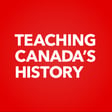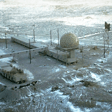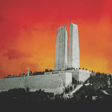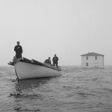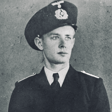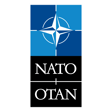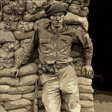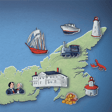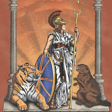Become a Creator today!Start creating today - Share your story with the world!
Start for free
00:00:00
00:00:01

The Role of Student Voice
This episode features Cherlyn Forth, Jon McPhail, and Kathryn Laframbroise, whose students are exploring histories in their own communities and regions and using creative ways to share their learning.
They talk about the role of student voice in determining historical significance, the value of place-based learning, and how they continue to find ideas for their classrooms.
Transcript
Introduction to Innovative History Teaching
00:00:11
Speaker
Welcome to Teaching Canada's History, the podcast where we explore how educators are bringing the past to life in classrooms across the country. I'm your host, Brooke Campbell. In this special series, we're speaking with the finalists for the 2025 Governor General's History Award for Excellence in Teaching, a national award that celebrates innovative and impactful approaches to teaching Canadian history.
00:00:32
Speaker
These conversations highlight how teachers and students are working together to interpret the past, connect it to the present, and share stories that matter.
Engaging Students with Local History
00:00:40
Speaker
In this episode, I'm joined by Sherilyn, John, and Catherine, whose students are exploring histories in their own communities and regions and using creative ways to share their learning.
00:00:50
Speaker
We talk about the role of student voice in determining historical significance, the value of place-based learning, and how they continue to find ideas for their classrooms. I hope you enjoy our discussion.
00:01:01
Speaker
Hello everyone, welcome and thank you so much for being here today. I'm really excited to be speaking with you all. Before we dive into our conversation, i'd love to take a moment to have some quick introductions.
00:01:14
Speaker
So can you all share your name and where you teach and maybe what grades or what classes, classes you teach? Sherilyn, do you want to start? then we'll go from there. Yeah. My name Sherilyn Swarth and I teach at a school called Centennial.
00:01:27
Speaker
in Edmonton, Alberta. I teach grade four and yeah, just love it. Been d teaching grade four for a few years. Catherine and John. I'm Catherine LaFramboise.
00:01:40
Speaker
I use she, her pronouns. We are in Treaty 1 territory, and so we live alongside that land here. We're specifically in the city of Winnipeg, Manitoba.
00:01:50
Speaker
And John and I are, well, we were in a grade 10 classroom this past year together, but we follow our kids into the next grade. So we will be grade 11 teachers next year in a really cool program called the Met School.
00:02:05
Speaker
Yes, I'm John McPhail, pronouns he, him. And I think one of the things that I love about our school, other than working with Catherine, is, which is true, is being right in the heart of of our city, of our province, and of our country. I think it's a really neat location to be, and it really resonates with what we do and and who we try to be.
00:02:32
Speaker
Thank you. I'm really excited to to have a you know teachers from different regions, but also the different grade levels here to to have this conversation, because I think that brings just such an interesting dynamic to to talking about teaching history and and social studies.
Teachers' Journey into Education
00:02:47
Speaker
So to get started, I wanted to take things back a little bit, because whenever I talk to teachers, I often hear them say that there's a story that, you know, or a moment that drew them into the profession.
00:03:00
Speaker
So I wanted to ask you all, what made you want to become a teacher? That is a good question. It's a tough one too. I can start, I guess. So I actually have a ah degree, a science degree in conservation biology, and I was doing a lot of outdoor education and a lot of contract work. and a lot of that contract work revolved around school bookings and school programs.
00:03:28
Speaker
and so The more I did that, the more I realized actually really wanted something a little bit more secure than contract work and really loved working with kids, which I never really anticipated.
00:03:41
Speaker
So I got my ed degree and yeah the rest is history. I'll go next. I had always considered being a teacher, found it was a cool job to be able to keep learning, you know, selfishly.
00:03:57
Speaker
But I also realized that there's a lot of moments where folks are forgotten in systems. And so that kind of became my driving force for wanting to be a teacher Being able to champion other folks, give space for other people to have voice, especially while they're young, because want our young people to realize that they have power and they have a lot of choice.
00:04:21
Speaker
So for me, and went to university to become a senior year's teacher, but then I ended up working in middle school for almost nine years and I loved it. Middle school is really magical.
00:04:32
Speaker
And then for me, I jumped to a really cool high school program that focuses on community-based learning and project-based learning. And so for me, it was just like the perfect fit to keep learning in my career, but then also like, yeah, keep my philosophy going in the in the classroom.
00:04:51
Speaker
And for me, I i come from ah family that has some teaching college. What has been part of, you know, my my my father and my mom and my grandmother all have teaching as part of their, of who they are.
00:05:07
Speaker
And part of what I've been looking for as I've been going through life, and this is not my first career. I started in film and then I owned a bakery. And part of what I've been looking for is creating and carving out a place in community.
00:05:22
Speaker
And being an educator is another piece of that being a part of people's lives and being um you know ah very specific piece of that puzzle you know in a community i think is something that i've coming from a small town i've been looking for and and wanting to create or to plug myself into so this is another part on that journey for me here Yeah, I love I love how you've all come to the profession in different ways, but there's still a lot of like common through lines I'm hearing and and what do you want to achieve and and what you're doing with your work.
Innovative Student Projects in History
00:06:01
Speaker
You've all also done projects in your classrooms that have students, you know, applying historical thinking and considering different perspectives, sharing their knowledge, being involved in community.
00:06:15
Speaker
why don't you provide us like a quick, a quick snapshot of of your projects, know, just at a high level, what, what did you do? And what did maybe what did your students do?
00:06:26
Speaker
i think that would be really helpful for our listeners to get some more insight into your classrooms. So maybe Catherine and John, you could start. oh sure Sure. You want to do this?
00:06:38
Speaker
Well, I think like we could both do that. um I don't know. For me, I'll start with a little snippet. For us, we've noticed a lot of like placelessness is a huge issue in in community.
00:06:51
Speaker
Not realizing where you are is ah is a significant problem, right? Because how do you ah plan forward or think about your current actions or future actions when you're not acknowledging where you are now and what has been before you?
00:07:07
Speaker
um And so that's really what sparked part of this project for us and having our school community but basically strengthen their understanding and appreciation for the area where our school is located and we, you know, reside every day here.
00:07:24
Speaker
um And then maybe, John, you can dive into some of the specifics. Sure. So we we started with ah a news story. There was a building that was burnt to the ground and the building right next to it that was connected to it was almost lost. And it was the first black union in Canada. That was their head office.
00:07:43
Speaker
And that's something that isn't on a plaque and it's not common knowledge. And we wanted to think about what that means for our community to have so much history, specifically BIPOC history, that is not being recognized and is being allowed to be erased through the passage of time.
00:08:04
Speaker
So we talked to our students and we got everybody to brainstorm a little bit about what we would like to do, ah what that might look like. It would also correspond with Black History Month. And so we decided to do a history tour, a walking tour.
00:08:19
Speaker
But one of the things that Catherine and I had talked about is how sometimes when we do these whole school activities, it is one class that's really doing the bulk of the learning.
00:08:30
Speaker
And everyone else is just sort of along for the ride. And it doesn't feel like everyone's really invested. And so we talked about how we could change that. For our project, what we did was we got our grade 10 students to start by coming up with locations, doing some research and finding out some history connected to those locations that would really emphasize either some really horrific and hard things about our our place and our history, but also some things to celebrate about our place and our history and our current place in this history and this place.
00:09:03
Speaker
And then we opened it up to the other grades and we said, here's the locations, here's the research that we've been looking at. We want you to write the scripts. We want you to read over the stuff, to engage in this information, pull out what you think is the most important parts. And if you've got different things that you want to bring in that isn't being presented, but bring those things in too.
00:09:26
Speaker
And so then each grade level created a script for each various location. And then on the day, our students got to sort of see what other grade levels turned their research into.
00:09:38
Speaker
And so it became a real... grade level sharing activity. And it became something, ah think there was a lot of inherent buy-in because every grade was putting some sweat equity and some thinking into it.
00:09:50
Speaker
And there was a lot of critical thinking happening, which is really neat. Thank you so much. And Sherilyn, do you want to share what what you've done in your classroom? Sure. So in grade four in Alberta, students, the curriculum focuses on the history of Alberta. Essentially, that's a part of it.
00:10:07
Speaker
So it's the first time that grade fours are really exposed to the idea of where everything kind of came from. And it's the first time they've really they really start to understand about truth and reconciliation.
00:10:21
Speaker
um The first time they really learn about the truth. And a lot of grade fours are quite shocked when they're learning a about the history and you know how Alberta grew.
00:10:32
Speaker
beach became Alberta how we know it today. So because it's such heavy topics at times and a lot of content, a lot of outcomes, I try to make it as engaging and fun as possible. So there was a lot of that work done, but we kind of took the focus of a timeline. I wanted to keep it chronological for the kids as they learned all about, you know, everything from Indigenous history and the way of life prior to colonization and the fur trade settlement, everything up to the Dirty 30s and the Great Depression, like they have to learn a lot of content.
00:11:11
Speaker
So we attended museum school, we had guests, we did everything we could possibly do that was engaging and fun, but so that they would really understand all of these things in chronological order.
00:11:26
Speaker
So then i the big project that we did to culminate all of that involved a little bit of technology. So we used ozobots, which are just little robots that you can program with color coding, and you can program to do all sorts of little fun things.
00:11:43
Speaker
And the students created script in little groups. They created a script that was basically the entire history of Alberta in order. And then they created a story map. So you think of like a poster board size paper.
00:11:58
Speaker
They created a map using the color coding and their and little drawings. And some of them had 3D pieces that went on it as well. And then they trained their robot. They programmed their robot to go along.
00:12:12
Speaker
the story map as they narrated it. um And yeah, it just really showed that they had a good understanding of the history of Alberta in a fun and engaging way for them.
00:12:25
Speaker
And they really, they went to town with, they had a lot of fun. They programmed their robot, for example, like when they were talking about the Northwest Mounted Police being formed, They programmed their robot to flash red and blue lights.
00:12:38
Speaker
And so it was just kind of cute. And then, you know, they had to time everything out. so that the story map worked in the time frame that they were narrating the script.
00:12:50
Speaker
So they had to train it to kind of slow down at certain points and speed up at certain points. And it really had a ah visual impact that I don't think you could have gotten just by reading papers and writing tests and stuff. So they they did a fantastic job with it and really embraced all those relationships and different perspectives as they they narrated their history of Alberta.
Importance of Local History in Education
00:13:10
Speaker
Thank you. i love the insight into not only your classrooms, but even your schools, especially in the case of Catherine and John. One thing I think that really stands out to me in both of these projects is that students are choosing what to focus on. You know, they're identifying which voices and stories to highlight and how to communicate that.
00:13:32
Speaker
You know, its it's a good exercise in historical significance in a lot of ways. Which makes me wonder, how do you support your students in deciding which stories to tell?
00:13:44
Speaker
Who's starting? You could if you want. Well, in the case of this specific project, I think it was combination of things. So there are some students who know pretty much right away.
00:13:56
Speaker
They will say, oh, I think we should do a story on this location because easily tie in.
00:14:06
Speaker
Right. Or whatever that specific sort of idea is. But then there's some students who maybe it's interest based. Maybe it's like, well, they're not coming up with anything maybe on their own right away, but you're really into sports.
00:14:17
Speaker
Maybe we should look at that or, you know, whatever sort of the in is for that student. Sometimes that's that's sort of the key to it. And then in other cases, it can be pretty, you know, it's a walking tour. It can be very logistical. It could be like, okay, well, what's a location that's close? Let's brainstorm, you know, based on a proximity, and then maybe we'll move from there.
00:14:39
Speaker
So it really depends based you know on the student and where they're at and how we can miss it. Sherlyn, do you have anything to add, you know, your your students... in making their timelines and in making their story maps, you know, picking which, which moments to include or to spend more time on and less time on? How did you, how did you support your students and in making those choices?
00:15:01
Speaker
Yeah, my, my students probably needed a little bit more guidance just because they're nine. So we, as a class, I'm decided and we created ah time a mini little timeline with a Google drawing sort of in real time as we were talking about what are the big events, I guess, over the timeline that we were talking about.
00:15:25
Speaker
And they really felt it was the most important to discuss that, you know, Indigenous people have been here for 10,000 years and that needed to be a really significant part. of their story maps.
00:15:37
Speaker
And after that, how quickly things happen. So they really wanted to focus on the fur trade settlement, the challenges that came along with that.
00:15:49
Speaker
And then they ended with the discovery of oil That's kind of where the point was in our learning. And then obviously things have happened since then, but that's where their story maps ended.
00:16:04
Speaker
So they really wanted to focus in on those five main areas. And then with that, their scripts were completely up to them what they wanted to include and which perspectives and how many perspectives they wanted to include, which I think you know gave them that power to focus on the things they felt were important.
00:16:23
Speaker
Another connection that I i think about when when I listen to to all of you talk is just how deeply rooted these projects are in your communities and in your regions. You know, you're telling stories about, you know, local history or provincial history. It's so it's so place-based.
00:16:42
Speaker
And so why do you think it's important to to have that, you know, local or place-based connection to history when you're when you're teaching your students? I guess I'll go.
00:16:55
Speaker
i think for me, it's an overarching connection to like truth and reconciliation, understanding where you are now. um Again, where have you come from? who has been here before? Where are we going? um How do we live the good life has been a big foundation, I think, of both of our classrooms, our school, our school division.
00:17:18
Speaker
So for me, i feel like you learn more about your own identity when you understand place. And then you also learn about the the identity of others through through place And there needs to be sometimes more recognition and appreciation for the things that folks have built and fought for, for, you know, you have the privilege to experience it.
00:17:39
Speaker
So for me, that's, yeah, I would echo all of that. One of the things that, I think focusing on place does really well in addition to all of that is it can reveal pieces of of identity that were assumed that maybe aren't real.
00:17:56
Speaker
So when you look at the specifics of a place, you can start to see the details. right? You get to the granular and some of those big sweeping statements about a Canadian identity or or whatever sort of those those big sort of structural sort of things, sometimes you realize you need to re-examine or you need to add complexity. Yeah. And I think with grade four students, again, this is the beginning of their journey of learning about history and learning about the land and what was here before. It's pretty abstract for them to think about, right? When you think about grade fours and time,
00:18:31
Speaker
they really don't have a good, solid understanding of that. So it it does take a lot of time in class and through examples and videos and discussions and human library experiences where you can ask people, ask elders questions.
00:18:45
Speaker
And it takes a lot of that for them to really understand time. And I'm not sure if they fully do, but I think they start to, in grade four, they start to to realize that, you know, the school wasn't always there and the city wasn't always there. And what was there before? What did it look like? And they can really start to imagine things and...
00:19:09
Speaker
they really start to build their empathy and they start to understand that Alberta is a very multicultural place. And just even in our classroom, we have so many cultures represented. it was really interesting for some of them to share when we were talking about settlement, for example, that some of their families have been here for generations and some of them just moved here a few months ago.
00:19:36
Speaker
and that just that connection to the land that people still want to come here we have you know a lot of history and a lot of growth and just connecting them to that and having them understand that languages and culture and relationships are so yeah i often think back to my my own my own schooling and you know there's that excitement of when you know wherever you live is in what you're learning you're like hey I know that, like, that's, that's me, that's my community, or that's, you know, I live here, and and there's there's just something special about that. So have you ever, have your students ever made any comments about what it means to them to kind of see, you know, to see Winnipeg, or to see Alberta history, and feel that kind of, not even pride, but that sense of like, yes, I am here, and I i know, i now know more about its history. Are there any stories or anything like that in your classrooms?
00:20:27
Speaker
Yeah, with my students, they would often come back after we'd had discussions about things and they would mention that they they told their families and they were pretty excited when they realized that they actually know more about Alberta's history than their parents do.
00:20:42
Speaker
So they they were pretty proud of that. And I think it urged them actually to continue learning more because they wanted to continue to impress their families and things like that and to share their knowledge. So that was pretty cool. Yeah, and for us, a lot of our students live not right where our school is because they will live a little bit further north in some of the suburbs and and they'll be coming to what is sort of the downtown.
00:21:08
Speaker
And there's a lot of misconceptions and a lot of opinions about what downtown is or isn't. And it is really interesting to see these students starting to take ownership but our city in a way that I think most people who don't interact in the downtown as free don't really have a sense of what it is and and the history that is here and and the community that is here. And I think that's a really powerful thing. And I can see them taking ownership of this city in a way that is, think, foundational for making sure that we have taken responsibility for what we're doing, why we're doing it, and how we're doing it.
00:21:49
Speaker
And I think these students are getting there and starting feel it. Yeah, I would say my answer is probably similar. The amount of students and even adults that said like, oh my gosh, we actually had no idea about that or that or that.
00:22:05
Speaker
ah We had an interesting interaction, I think, even at our sports museum. um There was something with that that was like an uncovered story that the people at the sports museum didn't even know about, I think.
00:22:17
Speaker
Yeah, yeah. the The story that we had researched was something that they didn't have in their museum at all. Which was crazy. So that was kind of cool. such really cool Yeah. So even like, it's just a helpful story piece for like any age, any place and just goes to show that like, even places that are saying like, hey, we might know a lot, like a museum, there's things that they haven't had a chance to uncover. So that was a special thing to be a part of.
00:22:44
Speaker
Lots of really cool connections taking place
Adapting History Education for Students
00:22:47
Speaker
for sure. i know we've talked, you know, already a little bit about the fact that we're talking about, you know, students in grade four versus students in grade 10. Catherine, you mentioned you, you taught middle school for many years, you both are sticking with your grades and going be grade 11 next year. Like we're talking about a lot of a lot of different ages here. and in And in general, with what teachers would might experience in their classrooms. And that definitely shapes the kinds of conversations that you're you're able to have so what's something that you know might be specific to your age group or a specific age group you've taught in the past that you've really like learned to lean into when it comes to this historical thinking piece or community engagement you know how do you adapt your your teaching to these different ages I think is what I'm trying to trying to get at a little bit more
00:23:36
Speaker
Me again? I think Catherine should go. yeah Because, well, for me, I haven't done a whole lot of teaching. I'm fairly new to teaching. And so this age group, and you've got a great perspective. Yeah.
00:23:46
Speaker
So for me, I think a big thing has always been leaning into something that students feel passionate or curious about. So a lot of, I think, my teaching or guiding... has always been about, you know, what are folks interested in and interested in, and how do they see themselves leading this to action. So it's a lot of um thinking about, hey, like, what do we want to know?
00:24:09
Speaker
and then it's the like, what now piece, because we hopefully are always leading towards and an action, whether that's, um, and ah individual personal action? Or are you wanting to create broader change or ask people to act?
00:24:25
Speaker
So for me, I feel like once you lean into the interest, or like I said, the passion, sometimes it takes a little uncovering from the educator educator side. But once you do that, like they're pretty great at going in with like hardcore investigation, they want to know more. And then just like Sherilyn was saying, like students often feel like they feel injustice, right?
00:24:49
Speaker
Young people are so empathetic and compassionate and they don't understand sometimes, you know, why is the world this way? And like, I agree, but for them, they feel that fire.
00:25:01
Speaker
And so I want them to feel that, but I also want them to feel hope and empowerment and to encourage others to either speak up or step back and let other voices have a chance to be heard.
00:25:14
Speaker
So yeah. That's how I've kind of tackled that. I agree. And I think with the younger grades, we have to be really careful just that we're discussing things with age appropriate details, but enough so that they understand, but not too much yet.
00:25:36
Speaker
Because, you know, our history isn't pretty in a lot of cases, but I really try to emphasize perspective. So, Just for an example, of when the fur trade was happening, a lot of perspectives involved. you like they They could easily explain to you now like the viewpoint of the Hudson's Bay Company versus Indigenous people versus the voyageurs who had to make these travels. And yeah, I just think that was really powerful. So the perspectives, I think they really developed that skill a lot this year.
00:26:09
Speaker
Essentially, we're working towards... having students connect with the land because there is a huge disconnect with the land. So we're really trying to emphasize that with them and understand that the land's always been here will always be here and we need to be connected.
00:26:25
Speaker
And then of course, always the reconciliation. I really love that you all are talking about that sense of hope and that sense of, of looking forward and taking action and Yes, responsibility and connection to, you know, the TRC and what are what our obligations are. and I'm curious how you how you foster that that sense of, is it optimism? I don't even know what the word is, but that sense of hope and and make sure that your students, you know, in in looking at these very, know,
00:27:01
Speaker
heavy moments in history and dark moments and things that are really tough to grapple with, you know, still finding that path forward, how you how you feel you can how you support your students in doing that.
00:27:12
Speaker
I mean, sometimes it's not easy and sometimes you don't want to seem like you are putting a silver lining or putting a happy face on something that is something that is not meant to, to, you know, sometimes we need to sit in it.
00:27:26
Speaker
You know, I think that can be hard for us, but also hard for students. And, but it's also important. Sometimes we just need to sit in it and, and acknowledge that there are some incredibly difficult things and incredibly horrible things that we are have done and we continue to do quite but I think that the work to rectify these things and the work to acknowledge these things is joyful work. I think it's joy. I think by allowing yourself and your students to sit in this and to to charge a path forward and to acknowledge these things and to share these things and to put action towards these things, those are all righteous actions that are filled with joy and filled with hope.
00:28:06
Speaker
And I think that's that's what you've got to focus on. Yeah, agree. Just with the ah heavy content. right, that they are learning about the the truth and reconciliation, residential schools, all of that. I agree with the fact that, you know, that is heavy and you do have to sit with it.
00:28:24
Speaker
You do have to understand that it happened. The approach with the younger students is obviously that you have an opportunity to learn from the past and to never let... you know, these big mistakes happen again, that they're going to be leaders one day and in charge of voting, in charge of decision making one day, and they'll have to remember this history and remember what they're learning so they can make informed choices that will hopefully be beneficial to everyone involved.
00:28:54
Speaker
Yeah, and I think I would... say all those things as well. I think a solid portion of the work we do is like the celebration as well.
00:29:04
Speaker
So finding folks who've been strong advocates, showing success has also been important because we also don't ever want to jump into the like white savior mode either, right?
00:29:16
Speaker
So we're not looking to save the the people or save everything. It's understanding that There's strength in all of these communities, there's celebration in all of these communities, but there's also work to be done alongside.
00:29:32
Speaker
And those are just important, honest conversations to continue having, again, with our older students, but... I feel like exactly what John said, like, we do sit in a lot of different emotions. And part of our work as teachers has been been um that like emotional intelligence piece of like understanding, understanding how you're feeling and different strategies around that.
00:29:56
Speaker
And again, a lot of action is helpful, like figuring out what is your own next step is really helpful. Yeah, yeah. Living in that living in that tension. Yeah. but also honoring honoring that tension, but also coming up with those paths forward. It's, yeah, that's, I really like, I like all those responses and how you're how you're individually thinking about it for yourselves, but also then how you support an entire classroom also walking that path.
00:30:22
Speaker
I can only imagine how challenging
Inspiration Through Collaboration and Community
00:30:24
Speaker
that can be. In looking forward, thinking about, you know, what what you're going to do in the next school year, what you keep wanting to do, how do you stay inspired and keep finding new ideas for your classroom?
00:30:37
Speaker
Well, i'm I'm a very inspiring person. and so I just look in the mirror and I just soak it in. Now, what do I do? i don't do that. You know, so it's, you know, it's collaboration, I think, for me.
00:30:50
Speaker
I think for me, it is looking at others and feeling completely inspired by the work they're doing, by the action they're taking, by the advocacy, by the strength of their voice, by all of those things, and and trying not to be the one that messes it all up. i' gonna I'm going to try to step up.
00:31:11
Speaker
im to try to show up, and I'm going to try to do the work in in a good way.
00:31:17
Speaker
Yeah, I just find that the kids inspire me every year. Like when you get your new group, you kind of know what projects you might want to do. But sometimes things change and they have a really they have a passion you weren't expecting. And you just have to be ready to pivot and kind of let them roll with that within you know the constraints of your curriculum, of course. But you never really know where it's going go.
00:31:43
Speaker
I always like to include as much technology as I can and different engaging projects, activities, just because you know history can little... little boring at times.
00:31:56
Speaker
And I often have kids come in to grade four, not huge fans of social studies, not looking forward to it. And by the end of the year, they love it.
00:32:07
Speaker
And they, you know, they even say like, I never thought I'd really love social studies. Nobody likes social studies and they leave grade four loving it and wanting to know more. And I feel like if if I can keep doing that, then I will keep doing that.
00:32:21
Speaker
It's amazing. Yeah. For myself, ah inspiration. Again, similar to what has already but Yeah, obviously, John. But like, honestly, though, yes, absolutely. i think colleagues are a huge inspiration. Like, I feel very fortunate to come into this place of work every day, inspired by colleagues, students,
00:32:39
Speaker
people in the community. We work alongside a lot of organizations. So again, seeing all this work that people put into our world to help each other for today, tomorrow has been huge. But I think if I think about history, well, that's overwhelming. um But if I think about, you know, the idea of history, i think about the fact that, you know, each day is our new day, each day has a day and a night.
00:33:03
Speaker
We all have these seasons. There's a purpose in a lot of it. And some of it is really hard. But there's also so much good. Like I just can't help but see the good in people, ah in the land, in the animals.
00:33:18
Speaker
I just have a trust that, you know, we have a lot of power to be good. And I see young people every day working with that. And that's what inspires me to like, keep on going. We got this even on the last day of school today.
00:33:36
Speaker
Definitely. Well, with that, thank you so much, Sherilyn, Catherine and John for sharing your insights and stories and the incredible work that you're doing with your students. It's been it's been a real pleasure to to hear more about how you bring history to life in your classrooms and how you really make space for for those different perspectives and for your students.
00:34:00
Speaker
ah to to share their work. Before we go, i do want to close with one one last like quick rapid fire round.
One-Word Teaching Philosophy
00:34:07
Speaker
In one word, or maybe one sentence, but like in one word, what summarizes why you teach history or social studies?
00:34:17
Speaker
Who's going first? who wants to Who wants to get their word out so no one else can take it? yeah Yeah. You got a word? I have one. I'm going to say liberation.
00:34:28
Speaker
going to go with understanding and compassion. o Nice. Okay, John. Jeez. who Why, hey?
00:34:40
Speaker
this is tough This is very tough. I love to talk. And it so this yeah being limited to one word is very difficult for me. I think of Noel Harari talks about history in such an interesting way where it's about this hand reaching from the past and it's gripping the back of your head and it's it's forcing a certain perspective.
00:35:00
Speaker
And when you look at that hand and you start to get the grip of history off of your head, the perspective can widen and you can start to see who we really are, not who we've been told we have to be.
00:35:13
Speaker
And I think for me, that is where, where the, the good stuff is, so is because history is a story that has been told um by very specific people for very specific purpose. And if we start to see that,
00:35:33
Speaker
then we can start to loosen that grip and we can start to see ourselves for who we truly are, which is so much more interesting than the sort of like greedy survive at all costs sort of story we've been told.
00:35:46
Speaker
So I think that's a very long sentence and I'm stand behind every every word of it, period. I think John's word is maybe just perspective. It has to be the whole sentence.
00:35:59
Speaker
Otherwise it doesn't make sense. There'll be so many semicolons if I can describe this. as A dash here, a dash there. It'll be perfect. Thank you so much. Maybe your word is just un-gripped or de-gripped. What would it be?
00:36:16
Speaker
If I gave the word de-gripped with no explanation. No one would know. You laughed out of the room. i can't. We can just say hands and people will be like, what? Hands. It's all hands. Hands.
00:36:28
Speaker
Oh, that's wonderful. Thank you all so much. And thank you everyone for listening. We'll be back soon with more conversations from inspiring educators throughout the country.

